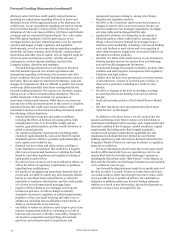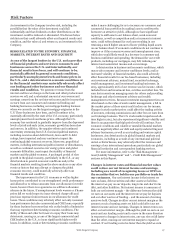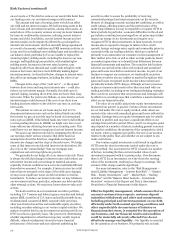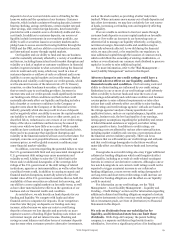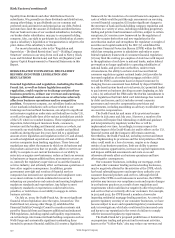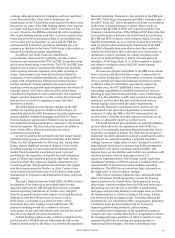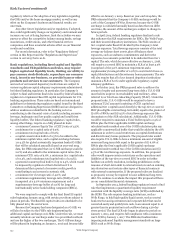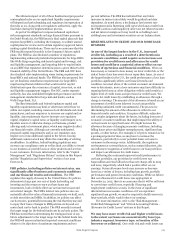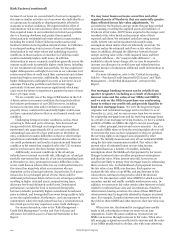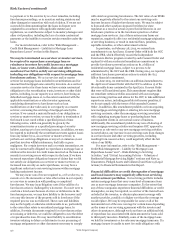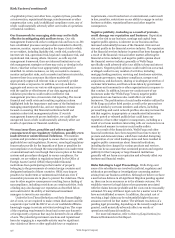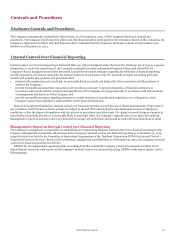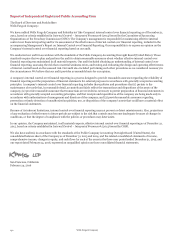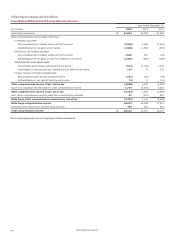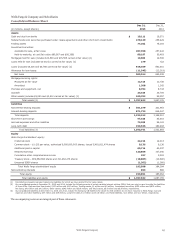Wells Fargo 2015 Annual Report Download - page 128
Download and view the complete annual report
Please find page 128 of the 2015 Wells Fargo annual report below. You can navigate through the pages in the report by either clicking on the pages listed below, or by using the keyword search tool below to find specific information within the annual report.Risk Factors (continued)
to payment or to the exercise by us of our remedies, including
foreclosure proceedings, or in an action seeking statutory and
other damages in connection with such violation. If we are not
successful in demonstrating that the loans in dispute were
originated in accordance with applicable statutes and
regulations, we could become subject to monetary damages and
other civil penalties, including the loss of certain contractual
payments or the inability to exercise certain remedies under the
loans.
For more information, refer to the “Risk Management –
Credit Risk Management – Liability for Mortgage Loan
Repurchase Losses” section in this Report.
We may be terminated as a servicer or master servicer,
be required to repurchase a mortgage loan or
reimburse investors for credit losses on a mortgage
loan, or incur costs, liabilities, fines and other
sanctions if we fail to satisfy our servicing obligations,
including our obligations with respect to mortgage loan
foreclosure actions. We act as servicer and/or master
servicer for mortgage loans included in securitizations and for
unsecuritized mortgage loans owned by investors. As a servicer
or master servicer for those loans we have certain contractual
obligations to the securitization trusts, investors or other third
parties, including, in our capacity as a servicer, foreclosing on
defaulted mortgage loans or, to the extent consistent with the
applicable securitization or other investor agreement,
considering alternatives to foreclosure such as loan
modifications or short sales and, in our capacity as a master
servicer, overseeing the servicing of mortgage loans by the
servicer. If we commit a material breach of our obligations as
servicer or master servicer, we may be subject to termination if
the breach is not cured within a specified period of time
following notice, which can generally be given by the
securitization trustee or a specified percentage of security
holders, causing us to lose servicing income. In addition, we may
be required to indemnify the securitization trustee against losses
from any failure by us, as a servicer or master servicer, to
perform our servicing obligations or any act or omission on our
part that involves willful misfeasance, bad faith or gross
negligence. For certain investors and/or certain transactions, we
may be contractually obligated to repurchase a mortgage loan or
reimburse the investor for credit losses incurred on the loan as a
remedy for servicing errors with respect to the loan. If we have
increased repurchase obligations because of claims that we did
not satisfy our obligations as a servicer or master servicer, or
increased loss severity on such repurchases, we may have a
significant reduction to net servicing income within mortgage
banking noninterest income.
We may incur costs if we are required to, or if we elect to, re-
execute or re-file documents or take other action in our capacity
as a servicer in connection with pending or completed
foreclosures. We may incur litigation costs if the validity of a
foreclosure action is challenged by a borrower. If a court were to
overturn a foreclosure because of errors or deficiencies in the
foreclosure process, we may have liability to the borrower and/
or to any title insurer of the property sold in foreclosure if the
required process was not followed. These costs and liabilities
may not be legally or otherwise reimbursable to us, particularly
to the extent they relate to securitized mortgage loans. In
addition, if certain documents required for a foreclosure action
are missing or defective, we could be obligated to cure the defect
or repurchase the loan. We may incur liability to securitization
investors relating to delays or deficiencies in our processing of
mortgage assignments or other documents necessary to comply
with state law governing foreclosures. The fair value of our MSRs
may be negatively affected to the extent our servicing costs
increase because of higher foreclosure costs. We may be subject
to fines and other sanctions imposed by federal or state
regulators as a result of actual or perceived deficiencies in our
foreclosure practices or in the foreclosure practices of other
mortgage loan servicers. Any of these actions may harm our
reputation, negatively affect our residential mortgage origination
or servicing business, or result in material fines, penalties,
equitable remedies, or other enforcement actions.
In particular, on February 28, 2013, we entered into
amendments to an April 2011 Consent Order with both the OCC
and the FRB, which effectively ceased the Independent
Foreclosure Review program created by such Consent Order and
replaced it with an accelerated remediation commitment to
provide foreclosure prevention actions on $1.2 billion of
residential mortgage loans, subject to a process to be
administered by the OCC and the FRB. During 2014, we reported
sufficient foreclosure prevention actions to satisfy the $1.2
billion financial commitment.
In June 2015, we entered into an additional amendment to
the April 2011 Consent Order with the OCC to address 15 of the
98 actionable items contained in the April 2011 Consent Order
that were still considered open. This amendment requires that
we remediate certain activities associated with our mortgage
loan servicing practices and allows for the OCC to take additional
supervisory action, including possible civil money penalties, if
we do not comply with the terms of this amended Consent
Order. In addition, this amendment prohibits us from acquiring
new mortgage servicing rights or entering into new mortgage
servicing contracts, other than mortgage servicing associated
with originating mortgage loans or purchasing loans from
correspondent clients in our normal course of business.
Additionally, this amendment prohibits any new off-shoring of
new mortgage servicing activities and requires OCC approval to
outsource or sub-service any new mortgage servicing activities.
As noted above, any increase in our servicing costs from changes
in our foreclosure and other servicing practices, including
resulting from consent orders, could negatively affect the fair
value of our MSRs.
For more information, refer to the “Risk Management –
Credit Risk Management – Liability for Mortgage Loan
Repurchase Losses” and “– Risks Relating to Servicing
Activities,” and “Critical Accounting Policies – Valuation of
Residential Mortgage Servicing Rights” sections and Note 14
(Guarantees, Pledged Assets and Collateral) and Note 15 (Legal
Actions) to Financial Statements in this Report.
Financial difficulties or credit downgrades of mortgage
and bond insurers may negatively affect our servicing
and investment portfolios. Our servicing portfolio includes
certain mortgage loans that carry some level of insurance from
one or more mortgage insurance companies. To the extent that
any of these companies experience financial difficulties or credit
downgrades, we may be required, as servicer of the insured loan
on behalf of the investor, to obtain replacement coverage with
another provider, possibly at a higher cost than the coverage we
would replace. We may be responsible for some or all of the
incremental cost of the new coverage for certain loans depending
on the terms of our servicing agreement with the investor and
other circumstances, although we do not have an additional risk
of repurchase loss associated with claim amounts for loans sold
to third-party investors. Similarly, some of the mortgage loans
we hold for investment or for sale carry mortgage insurance. If a
mortgage insurer is unable to meet its credit obligations with
Wells Fargo & Company
126


